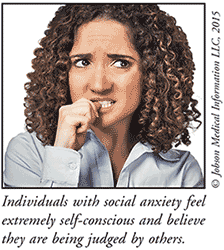US Pharm. 2015;40(11):17-18.
Excessive Fear of Social Situations
Social anxiety disorder, also called social phobia, is a feeling of extreme nervousness or fear in social situations. In order to be considered a disorder or phobia, social anxiety must interfere with daily living in school, at work, or in the community. This form of anxiety leads to distressing symptoms such as nausea, dizziness, pounding heartbeat, trembling, shortness of breath, and racing thoughts. For some people, social anxiety disorder can worsen until it controls a person’s life. Treatment includes a type of psychotherapy known as cognitive behavioral therapy (CBT), with or without medication. Drugs used to help treat this disorder include antianxiety medications, antidepressants, and beta-blockers.

Treatment Often Involves Psychological Counseling and Antidepressants
Social anxiety disorder is quite common, occurring in more than 10% of adults during their lifetime, with one-third being severely affected by the condition. However, only about 40% of people with social anxiety disorder ever receive treatment.
Defining Social Anxiety
People with social anxiety disorder are afraid of everyday activities in social settings. They are extremely self-conscious and believe they are being judged by others, even though they often realize their fear is excessive. They may have a general fear of all social activities, or only feel intense anxiety before or during a specific activity. Commonly feared triggers include buying or returning an item at a store, eating in public, using a public restroom, meeting strangers, coming to school or work late, or going to a party. Performance anxiety is one form of social anxiety, felt when a person is severely anxious in situations such as speech-making or public performance.
Social anxiety disorder is overwhelming; it is out of proportion to the anxiety most people feel in a particular social situation. This type of anxiety causes people to worry far ahead of an event, and often leads to avoidance of the situation altogether. In severe cases or if left untreated, social anxiety disorder can lead to a person being homebound, unable to go outside in any public space.
Reasons the Condition Develops
Social anxiety disorder can develop at any age, but most often begins early in childhood or during the teenage years. For most people with this condition, the anxiety slowly becomes more serious over time, although it can flare during periods of high stress and improve for periods of time as well.
The cause of this disorder is not fully understood, but it is probably a combination of genetics and environment. People with a family history of social anxiety are at higher risk, as are those who have been bullied, ridiculed, or abused. People with a physical condition that draws the attention of others are also more likely to experience an increased fear of being judged or embarrassed in social situations.
Symptoms of social anxiety disorder are similar to those generally seen in anxious persons. They include an upset stomach, dizziness, racing heart, trembling, trouble breathing, and racing thoughts. The diagnosis of social anxiety disorder is made when this intense social anxiety continues for 6 months or longer and causes avoidance of social situations or in other ways interferes with a person’s daily living.
Treatment Options: Psychotherapy and Medications
Treatment includes psychotherapy, sometimes along with medication. The goal of psychotherapy is to reduce anxiety in trigger situations. Using CBT, a person learns to label negative thoughts, gradually increases exposure to trigger situations, and develops coping behaviors for those situations.
Drug therapy for social anxiety disorder includes antianxiety medications, antidepressants, and beta-blockers. Antianxiety medications such as benzodiazepines work quickly, but they are primarily used for short-term treatment. These drugs cause drowsiness, require increasingly larger doses for effect, and are addictive. Newer antidepressants of the selective serotonin reuptake inhibitor (SSRI) class are specifically approved to treat social anxiety disorder. These drugs, including paroxetine and sertraline, are started at a low dose and slowly increased until they are effective or cause side effects. Unlike antianxiety drugs, SSRIs take several weeks to begin working and they are not addictive.
For performance anxiety, beta-blockers are the drugs most effective in relieving the sweating, trembling, shaky voice, and fast heartbeat many people experience with this type of anxiety. Beta-blockers work to prevent the symptoms of performance anxiety, but do not work well in treating other forms of social anxiety disorder.
Once diagnosed, social anxiety disorder is very treatable. The keys to successful treatment are time and patience.
To comment on this article, contact rdavidson@uspharmacist.com.





